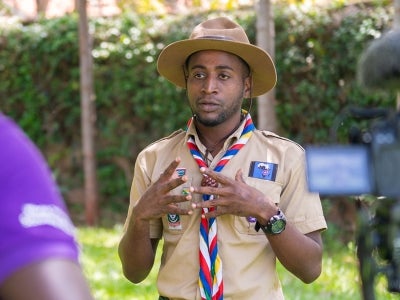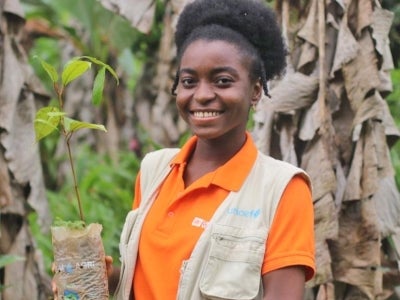
Photo courtesy of Vidalejandra Araujo Rojo
Vidalejandra Araujo Rojo, a veterinary science student from Colombia, will join her country’s delegation to COP28 as a youth ambassador with support from the Global Environment Facility and the Climate Reality Project America Latina. In an interview, she talked about her interest in animal conservation and her plan to focus on sustainable agricultural practices at COP28.
What is your area of expertise?
I am in my final year of studying veterinary medicine and animal husbandry at the Institución Universitaria Autónoma de Las Américas. I am also undertaking an internship at the Animal Reproduction Laboratory of La Universidad Nacional de Colombia. My educational and career path is intertwined with environmental and climate-related issues, particularly relating to animal conservation and the protection of endangered species.
How did you get interested in environmental issues?
My passion for environmental issues is deeply rooted in both personal experiences and professional pursuits. Growing up very close to rural Colombia made me very familiar with the intricate balance between communities and the environment. However, it was a pivotal event in 2013 that profoundly shaped my commitment to environmental advocacy.
My family was directly affected by the armed conflict in Colombia during that year. This experience changed my life. I not only faced the immediate consequences of violence but also became aware of the close relationships between agriculture, armed conflict, and the climate crisis. Violence in my country disrupted local agricultural practices, displaced communities, and heightened environmental vulnerabilities.
This experience woke me up and drove me to delve into understanding the broader implications of conflict on environmental management, sustainability, and the care and keeping of animals. Later, as I progressed in my career in veterinary science and animal husbandry, I observed a significant gap in awareness regarding sustainable agricultural practices, particularly in Colombia, and I am working to address that through my work.
At the same time, I witnessed a series of climatic upheavals and catastrophes in Colombia that deepened my commitment to combating climate change. My country’s loss of coastlines and experience with extreme floods, tropical storms, droughts, and desertification are not merely environmental concerns – they are matters of social justice and human rights. I am dedicated to advocating for those who are often voiceless and vulnerable in the face of these challenges.
How does armed conflict affect farming and animal care?
When violence disrupts communities, it often leads to significant displacement and the breakdown of traditional agricultural practices. For instance, in Colombia, regions affected by conflict experience forced displacement, causing farmers to abandon their lands abruptly. This upheaval results in neglected fields, disrupted irrigation systems, and a lack of care for livestock. Without continuous attention, the once-fertile lands degrade, affecting soil quality and reducing agricultural productivity. This directly impacts food security for these communities and beyond.
Additionally, the environmental repercussions of violence extend to the mistreatment and abandonment of animals. In times of conflict, the focus on survival often leads to a lack of resources or attention given to animal welfare. Livestock may be left behind or fall victim to neglect, impacting their health and, consequently, the livelihoods of those who rely on them.
People might not fully grasp how conflicts disrupt the delicate balance required for sustainable practices. For instance, there's a disconnect in understanding how environmental degradation affects not only landscapes but also the well-being and productivity of animals, which are fundamental for agricultural sustainability.
How did these experiences shape your career path?

Photo courtesy of Vidalejandra Araujo Rojo
The realization that marginalized social groups were disproportionately affected by conflict and violence intensified my resolve to take action. My goal extends beyond being a female agricultural scientist – I also aspire to be a voice for the victims of armed conflict. I am driven to raise awareness about the intersection of social and environmental justice, advocating for sustainable solutions that address the multifaceted challenges faced by communities impacted by conflict and environmental degradation.
Consider communities living in areas where armed conflict disrupts their traditional farming practices. These disruptions not only displace people from their homes but also sever their deep-rooted connections to the land, disrupting sustainable agricultural techniques passed down through generations.
Indigenous groups also often face immense challenges. Their holistic approach to land stewardship, one that's deeply interconnected with nature, faces severe disruption due to conflict-induced displacement. The result is not just a loss of physical homes but also a rupture in the cultural and spiritual relationship these communities have with the environment. It's vital for people to understand that the impacts of conflict extend far beyond physical violence; they encompass a loss of identity and heritage tied to sustainable land practices.
By shedding light on these examples, I aim to highlight the urgency of bridging social and environmental justice. It's crucial for people to understand that addressing environmental degradation in conflict zones isn’t just about restoring landscapes; it's about restoring dignity, empowering communities to regain control over their lives and land, and promoting resilience amidst adversity.
Ultimately, I aspire to draw attention to the interconnectedness of these issues and emphasize the need for sustainable solutions that prioritize the well-being of both people and the environment. This includes supporting initiatives that empower affected communities, promote regenerative agriculture, and foster a deeper understanding of the intertwined nature of social and ecological systems.
What message do you have for political leaders?
My message to today's political and business leaders, not only in Dubai but worldwide, is to recognize the urgency of addressing climate change as a collective responsibility. It's crucial that we work together to combat this crisis as it affects us all, regardless of our geographical location or economic status. In the fight against climate change, we must not forget the developing nations. Too often, these countries find themselves overlooked and under-supported, especially when it comes to crucial areas like education.
Many young people in Colombia dream of becoming leaders, scientists, and advocates for change, but without adequate resources and opportunities these dreams remain unfulfilled. I implore leaders to allocate resources that empower the youth of developing nations, including Colombia, to actively participate in the global effort to combat climate change.
Why is it important for you to be in the negotiating room at COP28?
I want to be a source of inspiration for the young girls and women in my country, showing that our voices can resonate globally, and our ideas hold substantial weight in shaping our shared future. I aim to champion gender equity, ensuring that women and girls are not only part of the conversation but are also driving forces for change.
Additionally, I am deeply committed to advocating for educational opportunities, particularly scholarships, for talented and motivated Colombian students. Education is the key to empowering our youth and fostering the next generation of leaders, scientists, and innovators. I see COP28 as a platform to raise awareness about the importance of investing in education, and I hope to forge partnerships and secure resources to make this vision a reality.
What issue are you most focused on in the climate negotiations?
One of the primary issues that deeply resonates with me is the promotion of environmentally friendly agriculture. This is of utmost importance because agriculture is not only a significant contributor to greenhouse gas emissions but also a sector profoundly impacted by the consequences of climate change. By advocating for sustainable agricultural practices, we can address both sides of this critical challenge – reducing emissions while building resilience.
Preventing desertification is also close to my heart. In Colombia and many other countries, desertification poses a severe threat, leading to land degradation and loss of fertile soil. It's a problem that not only affects the environment but also the livelihoods of countless communities. Ensuring that climate policies prioritize efforts to combat desertification is crucial to safeguarding our land and the people who depend on it.
The concept of a "just transition" is another pivotal issue for me. As we transition to more sustainable practices and economies, we must do so in a manner that is equitable and considers the welfare of workers and communities dependent on industries that may undergo transformation. This resonates with my commitment to social justice and ensuring that no one is left behind in our pursuit of a greener future.
Equally significant is gender equity within climate initiatives. Climate change disproportionately affects women and girls, particularly in developing countries like Colombia. Empowering women to actively participate in climate action is not only a matter of fairness but also a strategic imperative. Gender equity in climate policies can lead to more inclusive and effective solutions that benefit society as a whole.

Photo courtesy of Vidalejandra Araujo Rojo
How do you spend your spare time?
Spending time in nature is one of my greatest joys, whether it's taking leisurely walks, practicing yoga, or simply relishing the serenity of the outdoors. These activities not only help me stay grounded but also deepen my appreciation for the environment and its importance.
I'm an avid reader and find solace in the pages of a good book. Books have the power to transport me to different worlds and perspectives, further enriching my understanding of various cultures and ideas.
Traveling is another passion of mine, as it provides a unique opportunity to explore new cultures and broaden my horizons. I believe that intercultural experiences are essential for personal growth, as they foster empathy, tolerance, and a broader worldview.
In addition to these interests, I also engage in social work, particularly within educational initiatives. I actively collaborate with a foundation as an English teacher in rural areas, aiming to provide educational opportunities to underserved communities. It's deeply rewarding to witness the transformational power of education.


